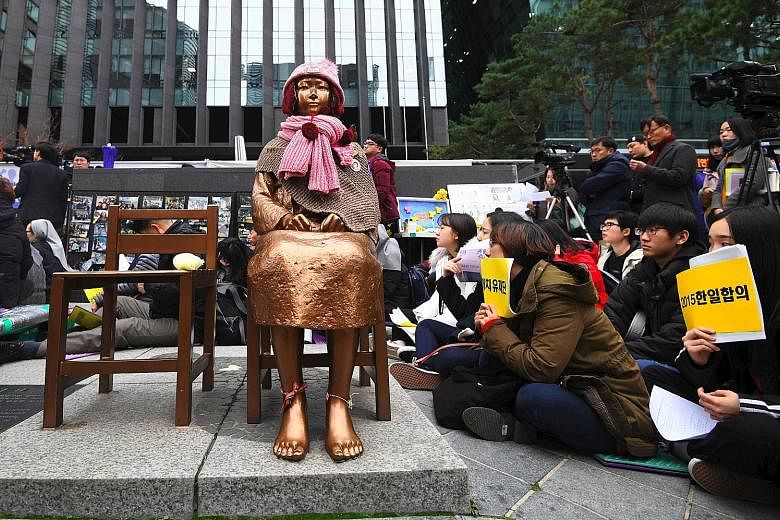In the latest dent in ties with Japan, the South Korean government has announced it would dissolve a Japan-funded foundation set up to help wartime sex slaves under a controversial agreement inked in 2015 to "irreversibly" settle the longstanding issue.
This prompted Japan to lodge a formal protest to the South Korean ambassador and urge Seoul to conduct itself responsibly.
South Korea's Ministry of Gender Equality and Family, which oversees the Reconciliation and Healing Foundation, said yesterday that the decision was reached together with the Ministry of Foreign Affairs (MFA), after consulting with relevant offices and collecting opinions.
The government will introduce other policies to "restore the honour and dignity of the victims", said Gender Equality and Family Minister Jin Sun-mee.
The move, which came as protesters gathered around a comfort women statue in Seoul in a weekly protest calling for the 2015 deal to be revoked, raised hackles in Japan.
Japanese Prime Minister Shinzo Abe warned that bilateral relations will be impossible if an internationally recognised pact is not kept. "The Japan-Korea deal three years ago was a final and irreversible settlement," he told reporters. "Japan has faithfully fulfilled the promise, and we urge South Korea to conduct itself responsibly as a member of the international community."
Japanese Foreign Minister Taro Kono said the decision was "totally unacceptable". His ministry summoned South Korea's Ambassador to Japan Lee Su-hoon to lodge a formal protest.
Experts say the foundation's closure is tantamount to nullifying the 2015 agreement, which former South Korean president Park Geun-hye signed hastily under pressure from the United States to improve ties with Japan. Both neighbours are security allies with the US.
But South Korea's MFA insisted yesterday the government is not seeking to void or renegotiate the pact. It argued that the foundation had not served its purpose as some victims refused to accept money from it.
Since 2016, less than half of the one billion yen (S$12.2 million) contribution from Japan has been dispensed to 34 victims and 58 families of late victims. This prompted the South Korean government to replace the fund with money from its own budget in July this year.
The ministry called on Japan to come up with other measures that the victims can accept, emphasising that the spirit of the 2015 deal was to restore the honour of the victims and heal their wounds.
Historians estimate that up to 200,000 Korean women were forced to become sex slaves for the Japanese military during World War II. But only 27 out of the 238 who registered with the South Korean government are alive today.
Observers warned that the move, which came on the heels of a Seoul court decision for a Japanese steelmaker to compensate four Koreans for forced labour during Japan's colonial rule, would further damage South Korea-Japan ties. There is also concern that political tension will affect trade and other exchanges.
English daily The Korea Times said in an editorial that Seoul's latest action has "added fuel to the fire" and it will be "inevitable to see tension between the two countries rise further".
Pointing to the fact that next year marks the centenary of South Korea's March 1 independence movement against Japanese rule, Dr Lee Myon-wee of Sejong Institute think-tank said the rift will get worse if both countries cannot settle historical issues, including comfort women and forced labour.
Japan insists that all issues related to war were settled in a 1965 treaty to normalise ties, but South Korea thinks many problems remain unresolved. "The gap between Japan's conservative politicians and Korea's liberal politicians is just too big to bridge, and it's too difficult to appease everyone," he said.

